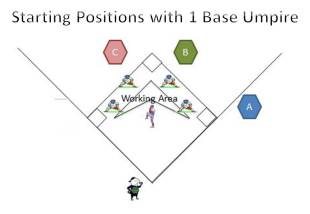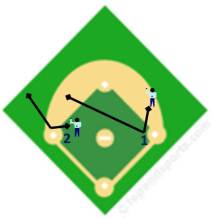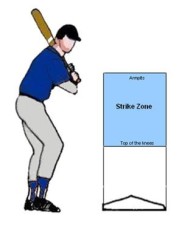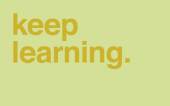Quick Start for New Umpires
New to umpiring? Want to learn in the fastest time possible?
Start with the beginner’s Quick Start page to learn the most important techniques.
Base Umpiring
Start a new play in one of three positions (A, B, C when one Base Umpire), usually one base ahead of the lead runner.
For balls hit and fielded in the infield, stay “outside” the base path to make your call. For balls fielded in the outfield, run “inside” the base path (into the Working Area) and turn around to view the play.
Move toward a spot that provides a good view angle (90 degrees is ideal). Try to set about 10 feet from the play, but favor angle over distance. Be firmly set, not moving, when the play happens and you make your call.
Two examples of good view angles on plays
#1 – force out play at 1B, throw from SS, after moving from A
# 2 – tag play at 3B, throw from LF, after moving from C
Videos
Making a call at 1st base (outside the base path)
Making a call at 2nd base (inside the base path)
Making Calls (the 3 most common)
Home Plate Umpiring
Use the official strike zone as a guide to be adapted
The official strike zone is over the plate, between the armpit and top of the knees. Widen your strike zone (height and width) considerably for younger players (8 – 10) and early in the season for all ages.
However you define your strike zone, be consistent throughout the game.
Watch the ball as it crosses home plate through the open space between the catcher and batter
Straddle the open space behind and between the batter and catcher (“the slot position”).
The graphic assumes a right-handed batter. Move to the opposite side of the catcher for left-handed batters.
Don’t flinch your head to the side as it will expose your temples. Look straight ahead and follow the ball with your eyes, not your head. More on Plate Umpire safety.
Making Calls (the four most common)
Yes! I want to learn more about ...
- base umpiring
- home plate umpiring






